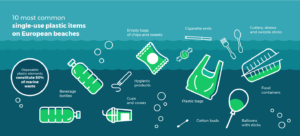WHAT CAN WE GLEAN FROM THE EU’S SINGLE-USE PLASTICS DIRECTIVE IN PREPARATION FOR HK’S OWN PROPOSED BAN?

Written by Claudia Lee
WHAT IS THE EU’S SINGLE-USE PLASTICS DIRECTIVE?
The European Union developed a Single-Use Plastics Directive in 2019 (SUPD), which promotes the transition to a circular economy by banning and reducing single-use plastics. The Directive went into force on July 3rd, 2019, giving member states three years (until July 3rd, 2021) to enact National Laws in accordance with the SUPD. The SUPD’s main aims are to tackle plastic pollution, to reduce the impacts of plastic waste on the environment and to transition to a circular economy via innovative and sustainable business models. The rules placed an emphasis on reducing marine plastic pollution, as it is found that plastics comprise 80% of all marine litter (of which an estimated 27% is composed of disposed or lost fishing gear). Marine litter accumulates in beaches and oceans, harming marine life and biodiversity and ultimately, affecting the health of humans at the end of the food chain.



WHAT PROGRESS HAS BEEN MADE SO FAR?
Based on an assessment of the EU countries’ transposition of the directive, so far, only several EU countries have adopted measures to transpose the directive into national law, while other countries have only adopted the bare minimum requirements stated in the directive. Some of the countries that have taken proactive measures include Estonia, France, Greece and Ireland. France is taking the lead single use plastics regulation; on top of transposing the directive into National Law, the country has also adopted additional measures as part of a National Strategy to reduce single use plastics. For example, France implemented a measure this year banning the use of plastic bottles in cultural and sport events. This is supplemented by a requirement to provide water fountains and free access to drinking water by 2022. All in all, the directive is a positive step forward and demonstrates the EU’s commitment to reduce the use of plastics and transitioning to a circular economy. Key next steps include ensuring all member states transpose the directive into their national law and extending the directive to cover more forms of plastics.
WHAT CAN HONG KONG LEARN FROM THE SUP DIRECTIVE?
Hong Kong’s EPD (Environmental Protection Department) recently launched a two-month public consultation on the Scheme on the Regulation of Disposable Plastic Tableware (ending on September 8th). This is part of the newly announced Waste Blueprint for Hong Kong, which aims at achieving waste-free seas by 2035. The scheme seeks to eliminate Expanded Polystyrene (EPS) tableware, including straws, stirrers, cups, plates and all types of cutleries by placing a ban on local EPS sales. The scheme also bans catering businesses from providing EPS tableware to customers.

Secondly, the Scheme will also regulate usage of non-EPS disposable plastic tableware. Phase one bans catering premises from providing customers with any type of disposable plastic tableware during dine-in services, while phase two extends this to banning takeaway services from providing disposable plastic tableware. The duration of each phase has not been announced as of July 2021.
The EPD’s public consultation is an exciting move towards the phasing out of single-use plastics in Hong Kong. However, the current scheme does not provide any quantitative targets or ramifications for non-adherence. Enforcement of policies is key if they are to succeed.
It is key for the EPD to ensure there are affordable, and readily available reusable tableware alternatives in place before the ban fully gets implemented so that tableware is not replaced by other single-use items. Further, the EPD should avoid working in silos, but together with businesses, civil society, government departments, and investors, to consider aligning other related environmental initiatives such as the implementation of the Extended Producer Responsibility Scheme in order to create a strong accountability framework for all stakeholders.
- Assessment of the EU countries’ transposition of the Single Use Plastics Directive
- Single Use Plastics Directive: NGOS called on Commission and EU countries to resist attempts to undermine separate collection of plastic bottles
- Circular Economy: Commission provides guidance for harmonised application of single use plastic rules and advances on monitoring of fishing gear
- Public consultation on Scheme on Regulation of Disposable Plastic Tableware
Interested in more?
2024
We’re Hiring – Marketing Interns Needed!
2024
Reflections from the Future Green Unconference 2.0: A Journey Towards Sustainable Food Systems
2024
SOURCING SEAFOOD RESPONSIBLY IS THE TOPIC OF OUR APRIL 2024 MEMBERS MONTHLY MEETUP
2024
REDUCE, REUSE, AND RECYCLE IS THE TOPIC OF OUR MARCH 2024 MEMBERS MONTHLY MEETUP
2024
PLANT-FORWARD, LESS, AND BETTER MEAT IS THE TOPIC OF OUR FEBRUARY 2024 MEMBERS MONTHLY MEETUP
2024
Marketing Coordinator
2024
The Recycling Crisis: Why Hong Kong Must Prioritise Reducing over Recycling
2024